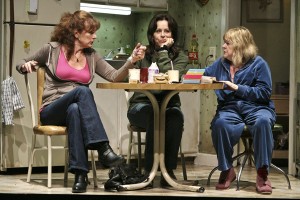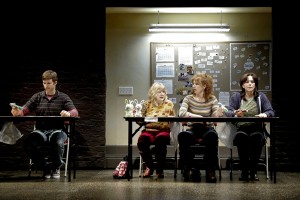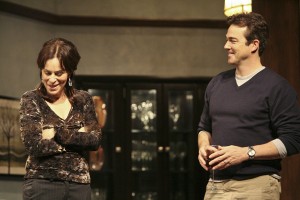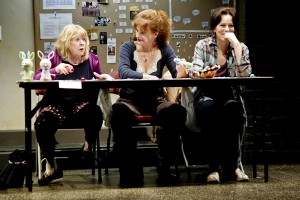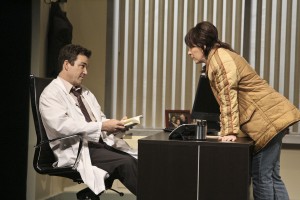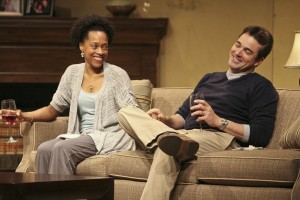AS GOOD AS IT GETS
In his extraordinary production of Good People at the Geffen, director Matt Shakman has validated the necessary ingredients of a great show:
First: Storytelling. In describing the plot of David Lindsay-Abaire’s Good People, one might categorize this seriocomedy as a “simple play,” as did the director. Shakman also said the play is about everyday people who live in South Boston, trying to make their way in the world – which is true. The way the story is told, however, is compelling. The protagonist Margie needs work in the worst way, yet she sabotages herself by getting fired from a Dollar Store for being consistently late. The middle-aged woman with a “retarded” daughter then approaches a successful doctor, her erstwhile high-school flame, for a job. But Margie’s desperation to survive makes her mouthy, degrading, unreliable and deceitful. From a Church Bingo Hall to the ratty dwelling she cannot afford, to a physician’s office and then his upscale home, we are compassionate to her plight, even as she is prone to undermine her opportunities. Margie may be an unremarkable person, but Lindsay-Abaire places her in remarkable situations.
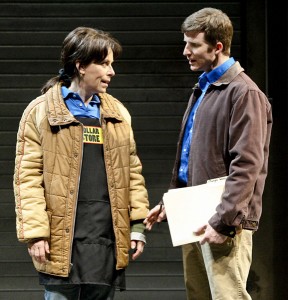 Second: Subtext. A substantial script contains universal, underlying themes that provoke the spectators to examine the world in which they live and their life philosophies. A satisfying ending doesn’t necessarily mean that the story is resolved or that a protagonist learns a life lesson. For me, gratification in the theater occurs when the play’s themes stay with me long after the show, leaving me riddled with questions:
Second: Subtext. A substantial script contains universal, underlying themes that provoke the spectators to examine the world in which they live and their life philosophies. A satisfying ending doesn’t necessarily mean that the story is resolved or that a protagonist learns a life lesson. For me, gratification in the theater occurs when the play’s themes stay with me long after the show, leaving me riddled with questions:
Can we get what we want if we work hard enough, or is that a myth? Does our luck increase once we start telling the truth about our lives? Does prosperity truly make us happy, or does the convenience associated with wealth merely camouflage our despair? Do our circumstances define who we are? Are we trapped by our socioeconomic status, or is that just an illusion? If you lie to protect someone, are you a good person?
Third: Casting. Jane Kaczmarek gives a career-defining performance as the disillusioned Margie. She moves about the stage like a boxer who has lost too many matches: the drooping shoulders indicate a woman who can barely carry her own troubles, let alone those of her disabled daughter; the stiff back specifies a resolute defiance, left over from Margie’s upbringing as a Boston Southie; and the barely perceptible hobble identifies her years standing around in lower-class jobs. With a spot-on dialect that is never showy, Kaczmarek keeps Margie’s turmoil at bay – the inner battle between defeat and staunch pride manifests itself in glimpses of melancholy and decency.
Marylouise Burke plays Dottie, Margie’s landlord and combative friend; Burke is such a distinctive actress that she threatens to steal focus just by filling in her bingo card. John Tenney has one of the best arcs of any character as Mike, the doctor who escaped the claws of South Boston; his reencounter with Margie in his office starts off as mild discomfort and pity, but once Margie pays a visit to his comfortable home, the charismatic and multi-faceted Tenney makes clear that an upbringing in South Boston can never be shaken.
Cherise Booth is luminescent as the doctor’s black wife, Kate, who prods Margie for information about Mike’s past; she capably exudes either anger, jealousy, shock or love with the ease of changing a coat, and every reaction rings true. Rounding out the cast are Sara Botsford as Margie’s tough-talking friend who dares Margie to ask Mike for a job, and Brad Fleischer is so impeccably unobtrusive as Margie’s Dollar Store boss Stevie that we don’t even notice that an actor is doing his job.
Fourth: Design Elements. The Geffen Playhouse never skimps when it comes to technical work, but the rapid scene changes of Craig Siebels’ set are a wonder; he takes us from alley, to kitchen, to a church, to an office, to the enormous foyer and posh living room of an upscale home in the breathtaking blink of an eye. E.B. Brooks’ costumes are integral to each character: the dress that Margie dons for a classy party has clearly seen better days; Elizabeth Harper’s lighting is remarkably tight and Jonathan Snipes’ sound design and original music are both discreet.
Fifth: Direction. Mr. Shakman has always had a keen eye with actors, based on his supernatural ability to mold the work of his thespians at the Black Dalia Theatre (Forgiveness still burns in my memory), so I am elated that he has been entrusted with a larger L.A. stage. Would that more large houses (namely the Center Theatre Group) will hand over shows to great L.A. storefront directors (namely Michael Matthews).
I have some minor issues with the construction of the first act, but the second act is perfection. Once Margie enters a realm she most likely will never attain – that comfortable kingdom of the lucky and the fortunate right across town – the play’s explosive exploration of the haves and have-nots leaves an indelible impression.
photos by Michael Lamont
Good People
Geffen Playhouse in Westwood
ends on May 13, 2012
for tickets, call 310-208-5454 or visit Geffen

